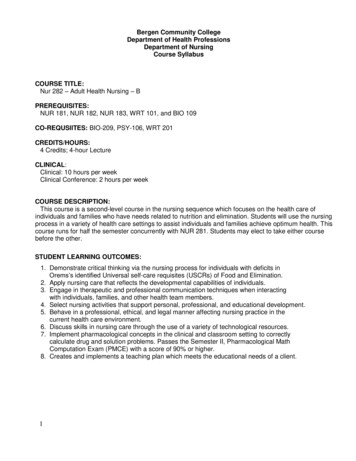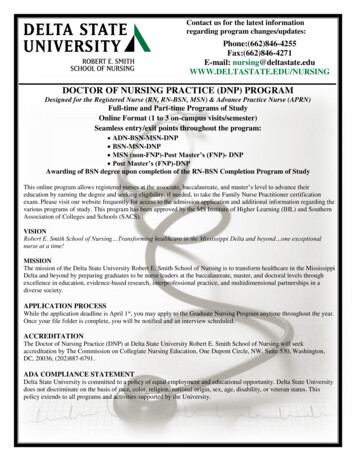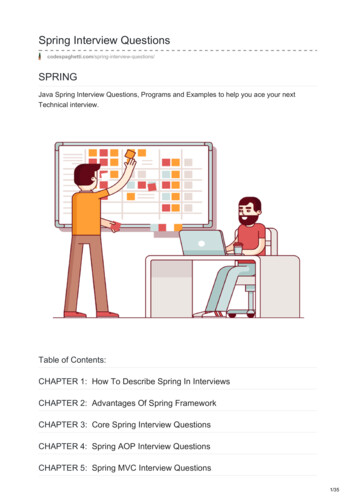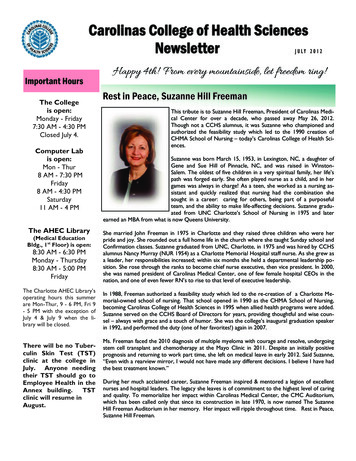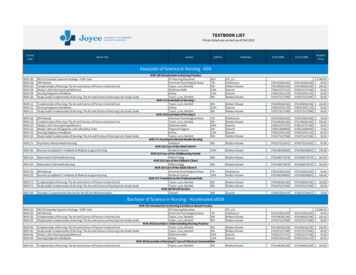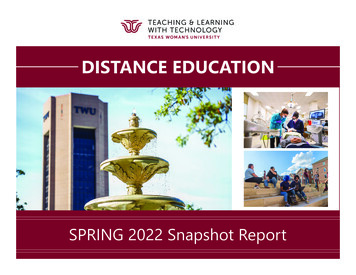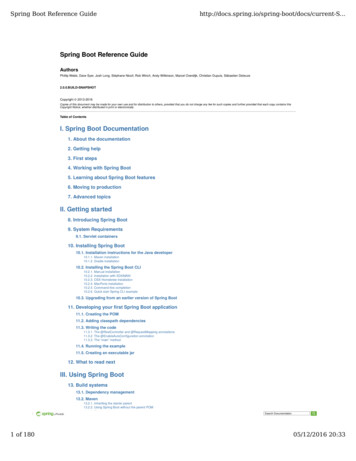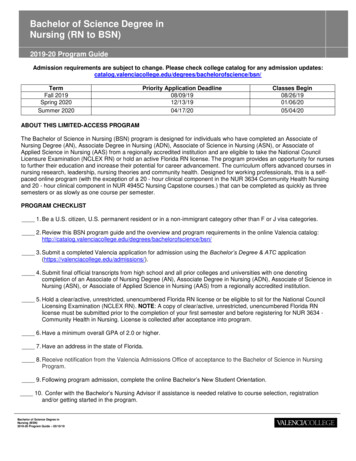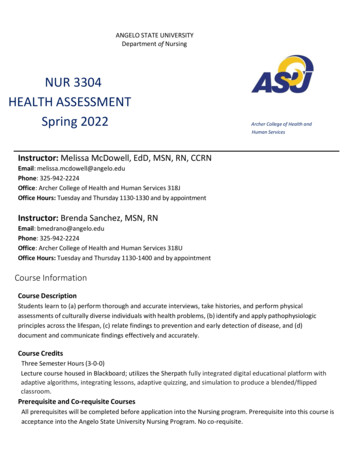
Transcription
ANGELO STATE UNIVERSITYDepartment of NursingNUR 3304HEALTH ASSESSMENTSpring 2022Archer College of Health andHuman ServicesInstructor: Melissa McDowell, EdD, MSN, RN, CCRNEmail: melissa.mcdowell@angelo.eduPhone: 325-942-2224Office: Archer College of Health and Human Services 318JOffice Hours: Tuesday and Thursday 1130-1330 and by appointmentInstructor: Brenda Sanchez, MSN, RNEmail: bmedrano@angelo.eduPhone: 325-942-2224Office: Archer College of Health and Human Services 318UOffice Hours: Tuesday and Thursday 1130-1400 and by appointmentCourse InformationCourse DescriptionStudents learn to (a) perform thorough and accurate interviews, take histories, and perform physicalassessments of culturally diverse individuals with health problems, (b) identify and apply pathophysiologicprinciples across the lifespan, (c) relate findings to prevention and early detection of disease, and (d)document and communicate findings effectively and accurately.Course CreditsThree Semester Hours (3-0-0)Lecture course housed in Blackboard; utilizes the Sherpath fully integrated digital educational platform withadaptive algorithms, integrating lessons, adaptive quizzing, and simulation to produce a blended/flippedclassroom.Prerequisite and Co-requisite CoursesAll prerequisites will be completed before application into the Nursing program. Prerequisite into this course isacceptance into the Angelo State University Nursing Program. No co-requisite.
ANGELO STATE UNIVERSITYDepartment of NursingPrerequisite SkillsAccessing internet web sites, use of ASU Library resources, and proficiency with Microsoft Word and/orPowerPoint are an expectation of the Generic BSN program. Computer requirements are further delineated inthe Department of Nursing Undergraduate Student Handbook. Tutorials for ASU Library and for Blackboard areavailable through RamPort. The ASU Nursing Program Undergraduate Student Handbook should be reviewedbefore taking this course.BSN Program OutcomesUpon completion of the program of study for the Generic BSN, the graduate will be prepared to:1. Integrate nursing and related theories into the planning and/or delivery of safe nursing care.2. Engage leadership concepts, skills and decision-making in the planning and/or implementation of patientsafety and quality improvement initiatives.3. Identify and appraise best research evidence to improve and promote quality patient outcomes.4. Utilize technology to access information, evaluate patient data, and/or document care.5. Participate in political/legislative processes to influence healthcare policy.6. Engage in effective collaboration and communication within interdisciplinary teams.7. Design and/or implement health promotion & disease prevention strategies for culturally competent care.8. Demonstrate standards of professional, ethical, and legal conduct.9. Practice and/or coordinate, at the level of the baccalaureate prepared nurse, to plan and/or implementpatient centeredStudent Learning OutcomesStudent Learning OutcomeBy completing all course requirements,students will be able to:1. Employ professionalcommunication and interviewingstrategies to obtain an accuratehealth history.Assignment(s) or activity(ies)validating outcome achievement:Health History AssignmentLecture, Sherpath lessonsWeekly peer check-offsAdaptive Quizzing/WeeklyquizzesExamsMapping toBSNProgramOutcomes1, 3, 4Mapping toBSNEssentialsVI, VII, IXMapping toQSENPCCTCEBP SI
ANGELO STATE UNIVERSITYDepartment of NursingStudent Learning OutcomeBy completing all course requirements,students will be able to:2. Perform holistic psychosocialand physical assessments ofindividuals in a simulated settingusing knowledge & skills fromhumanities, nursing, biological, &behavioral sciences3. Examine risk factors, preventivehealth practices, protectivemechanisms, and traditional andcomplementary health practicesthat influence the health ofindividuals and their familiesacross the lifespan.4. Relate normal and abnormalassessment findings to underlyingphysiologic, pathophysiologicprocesses, medical diagnoses, andtherapeutic interventionsAssignment(s) or activity(ies)validating outcome achievement:Assessment VideosClass participation –discussionand activities, skills practice, inclass assignments and casestudiesEHR assignmentsATI Health Assessment ModuleLecture, Sherpath lessonsWeekly Peer ment VideosClass participation –discussionand activities, skills practice, inclass assignments and casestudiesSkills practiceComprehensive PhysicalAssessmentSherpath SimulationATIHealth History AssignmentLecture, Sherpath LessonsWeekly Check OffsAdaptive Quizzes/WeeklyquizzesExamsClass participation- discussionand power points, skills practice,group activities, and casestudiesSkills PracticeLecture, Sherpath LessonsWeekly Check OffsAdaptive Quizzes/WeeklyquizzesExamsMapping toBSNProgramOutcomes4Mapping toBSNEssentialsIXMapping toQSENPCCTCEBP SI1, 4I, VII, IXPCCTCEBPQISI3, 4IXPCCTCEBPQIS
ANGELO STATE UNIVERSITYDepartment of NursingStudent Learning OutcomeBy completing all course requirements,students will be able to:5. Examine risk reduction, anddisease prevention for individualsbased on standards of care, healthpromotion models, and behavioraland developmental theories.Assignment(s) or activity(ies)validating outcome achievement:Class participation- discussionand power points, skills practice,group activities, and casestudiesSkills PracticeATILecture, Sherpath LessonsAdaptive Quizzes/WeeklyquizzesExamsClass participation- discussionand power points, skills practice,group activities, and casestudiesSkills PracticeMapping toBSNProgramOutcomesMapping toBSNEssentialsMapping toQSENI1, 4VI, VII, IXPCCTCEBPQISICourse DeliveryThis course is both face-to-face course and online delivery. Class meets on Tuesdays and Thursdays from2:00 p.m. – 4:50 p.m. in the Archer College of Health and Human Services- HHS 106. This class has a blackboardcomponent where course information is accessed at ASU's Blackboard Learning Management System.Required Texts and EquipmentEHR Tutor Academic Electronic Health Records SystemthJarvis, C. (2020). Sherpath Plus 1 Color Print for Health Assessment. (8 ed.). St Louis, Mo: SaundersthJarvis, C. (2020). Physical examination & health assessment (8 ed.). St. Louis, Mo: SaundersthJarvis, C. (2020). Pocket companion physical examination & health assessment (8 Ed.). St. Louis, Mo:SaundersCost saving bundles:Includes Sherpath, Jarvis Ebook, Jarvis color print textbook and Jarvis Pocket CompanionRequired Class Equipment: This equipment includes but is not limited to a solid black, blue or white cloth facemask/covering with only the ASU logo, N95 respirator mask, clear goggles with only black or blue trim or a faceshield, stethoscope, penlight, watch (that measures seconds), trauma scissors/shears, syllabus, assessmentchecklist, course calendar, and selected textbooks. Smart watches including Apple watches will not be allowedduring exam testing.
ANGELO STATE UNIVERSITYDepartment of NursingBring a laptop or Wi-Fi access device to class each week to access Sherpath course content onEvolve. Since laptops tablets, and/or iPad are not required of students in the nursing program,please notify instructor if assistance is needed for access to a device during class.Technology Requirements Computer with MAC or Windows Operating SystemHigh Speed Internet AccessRefer to Angelo State University’s Distance Education website for further technology requirements:Angelo State University's Distance Education WebsiteRefer to Angelo State University’s Distance Education website for further technology requirements : Angelo StateUniversity's Distance Education WebsiteTopic OutlineSee the course calendar in Blackboard and Evolve for specific module dates, objectives, lessons, activities, andassignments.Module 1: Interviewing and Cultural ConsiderationsModule 2: Patient History TakingModule 3: Lymphatic SystemModule 4: Examination Techniques and EquipmentModule 5: Vital Signs and PainModule 6: Growth and DevelopmentModule 7: NutritionModule 8: Mental StatusModule 9: Skin, Hair and NailsModule 10: Head and Neck; Eyes, Ears, Nose, and Throat (EENT)Module 11: Chest and LungsModule 12: HeartModule 13: Peripheral VascularModule 14: AbdomenModule 15: Musculoskeletal SystemModule 16: Neurological SystemModule 17: Head to Toe ExaminationModule 18: Breasts and AxillaeModule 19: Female GenitaliaModule 20: Male Genitalia and Prostate; RectumCommunicationFaculty will respond to email and/or telephone messages within 24 hours during working hours Monday throughFriday. Weekend messages may not be returned until Monday.
ANGELO STATE UNIVERSITYDepartment of NursingWritten communication via email: All private communication will be done exclusively through your ASU emailaddress. Check frequently for announcements and policy changes. In your emails to faculty, include the coursename and section number in your subject line.Virtual communication: Office hours and/or advising may be done with the assistance of the telephone,Collaborate, Skype, etc.Use Good "Netiquette": Check the discussion frequently and respond appropriately and on subject. Focus on one subject per message and use pertinent subject titles. Capitalize words only to highlight a point or for titles. Otherwise, capitalizing is generally viewed asSHOUTING! Be professional and careful with your online interaction. Proper address for faculty is by formal title such asDr. or Ms./Mr. Jones unless invited by faculty to use a less formal approach. Cite all quotes, references, and sources. When posting a long message, it is generally considered courteous to warn readers at the beginning of themessage that it is a lengthy post. It is extremely rude to forward someone else's messages without their permission. It is fine to use humor, but use it carefully. The absence of face-to-face cues can cause humor to bemisinterpreted as criticism or flaming (angry, antagonistic criticism). Feel free to use emoticons such as J or:) to let others know you are being humorous.(The "netiquette" guidelines were adapted from Arlene H. Rinald's article, The Net User Guidelines andNetiquette, Florida Atlantic University, 1994, available from Netcom.)GradingEvaluation and GradesCourse grades will be determined as indicated in the table below.AssessmentPercent/Points of TotalGradeExams35%Weekly Quizzes15%Weekly Course Participation5%Health History Assignment15%Comprehensive Physical Assessment30%Total100%
ANGELO STATE UNIVERSITYDepartment of NursingGrading SystemCourse grades will be dependent upon completing course requirements and meeting the student learningoutcomes.The following grading scale is in use for this course:A 90.00-100 pointsB 80.00-89.99 pointsC 70.00-79.99 pointsD 60.00-69.99 pointsF 0-59.99 points (Grades are not rounded up)Teaching Strategies and Methods Class Lecture and DiscussionSimulation and DemonstrationVideosAssigned Readings/LessonsWeekly assigned quizzesAdaptive quizzingExamsWeekly Peer Check-offsHandouts and PresentationsPair & Group ActivitiesClass Activities and InteractionsInternet ResourcesCase StudiesATI TutorialStudents are expected to be “active learners.” It is a basic assumption of the instructor that students will beinvolved (beyond the materials and lectures presented in the course) discovering, processing, and applying thecourse information using peer-review journal articles, researching additional information and examples on theInternet, and discussing course material and clinical experiences with their peers.Assignment and Activity Descriptions*Please note: Rubrics for all assignments and activities are located at the end of this syllabus.Exams4 exams over the course of the semester will evaluate student’s knowledge, comprehension, application, andanalysis of course content and objectives. 50 questions will be given over 75 minutes each test.
ANGELO STATE UNIVERSITYDepartment of NursingThe exams will be pencil and paper and scored using a scantron form. Scantron forms will be provided. Studentsmust bring a pencil to each exam. All exams will be given in a proctored environment. The first 3 exams arescheduled during lecture days and will be given at the beginning of class. Lecture and routine class activities willimmediately follow. The 4th exam will be scheduled during the designated date and time for the final exam. Failureto complete any exam will result in a zero on the exam. Failure to complete the 4 th and final exam will result incourse failure. Please see the course calendar for the specific assigned test days.Exam reviews will be provided for exams. Exam reviews will be held within one week after the respective exam hasbeen completed by all students. The time, duration, place, and day of each review will be determined by the courseinstructor. During exam reviews, all students must leave all personal belongings at the door. Students will berequired to sign-in at the door of the exam review. The student will be allowed to review every question, option,andcorrect answer on the respective exam. Exam reviews are meant to provide students the opportunityto reviewexamcontent only and are not to offer time to debate correct answers. There will be faculty present toanswer questionsduring the exam review. Once a student has completed an exam review, no request to review that sameexam willbe granted for the course of the semester.Adaptive QuizzingElsevier Adaptive Quizzing (EAQ) is a mobile, optimized formative assessment tool within Sherpath that providespersonalized questions to help students succeed in the course and study more effectively for high- stakes exams.Students will be assigned an EAQ during the week prior to class day. Credit for completion of the adaptivequizzing assignments for the week will be incorporated as a portion of the participation grade. Failure tocomplete the adaptive quizzing assignment by 1200 on the assigned date will result in a 50 point deduction fromthe participation grade.QuizzesNon-adaptive quizzes will be given on Tuesdays and Thursdays to evaluate the students’ knowledge of assignedlectures, reading, and lessons. Quizzes will consist of 10-20 questions from the corresponding Sherpath lessons andreading.Course ParticipationCourse participation consists of student’s active participation in this course. Students will be assigned a grade forcourse participation per the Course Participation Rubric. Course participation consists of discussion, classactivities, presentations, and/or demonstrations in class along with completing weekly assignments,documentation, and active skills practice.Sherpath Weekly LessonsLessons deliver course content as engaging, didactic experience with multimedia, confidence indicators, adaptiveremediation, mini assessments, and a summary assessment to gauge understanding of the material.
ANGELO STATE UNIVERSITYDepartment of NursingATIThe ATI Physical Assessment Adult Tutorial Module provides the student comprehensive information aboutphysical assessment for the adult patient. This tutorial and corresponding pre and post-tests are to be completedaccording to the course calendar. The Post-test grade logged in ATI will count as that week’s quiz grade. Studentsare encouraged to utilize the ATI Health Assessment Videos in the module throughout the semester.Health History AssignmentStudents will demonstrate knowledge of interviewing skills, the components of a health history, recording thehistory data, and assigning three nursing diagnoses. A complete health history will be completed and submittedmid-semester according to the attached grading rubric and course schedule. Students will submit a detailedsubjective health history on a volunteering adult over age 50 on the provided form.Students are not to provide any identifying data on the patient – only the demographics requested in the gradingrubric. The health history assignment is totally SUBJECTIVE - interviewing and questioning the patient. Studentsare encouraged to practice the physical assessment but will not be required to document or submit. Use Chapter4 of the course text "The Complete Health History" as a guide to complete the assignment along with thesubjective interview portion of each chapter as needed to elaborate on noted problems.Comprehensive Physical AssessmentStudents will demonstrate skills of inspection, percussion, palpation, and auscultation; demonstrate correct useof instruments; use appropriate medical terminology; choreograph the complete examination in a systematicmanner; describe the findings of the examination; demonstrate appropriate infection control and safetymeasures, and demonstrate proper documentation of the normal physical exam. At the end of the semester,students will conduct the complete physical assessment for faculty review during a timed 30 minute period on afellow classmate volunteer according to the Physical Assessment Grading Rubric.The grading rubric may be used as a reference during the assessment; although, points will be deducted forreference to the rubric. Students are responsible for self- study and seeking additional guidance or assistance asneeded in preparing for the comprehensive physical exam. Chapter course videos, ATI Health Assessment Videos,and Clinical Skills Health Assessment videos are available for review/practice and the Jarvis Head to ToeExamination of the Adult Guide are suggested resources for practice along with course textbook. It is highlysuggested students utilize Nursing Lab facilities for practice and self-study throughout the semester. A minimumgrade of 70 on this assignment is required to pass the course. Failure to complete during the 30 minute timeallotted will result in loss of points for the remaining time with a maximum time limit of 35 minutes.Assignment SubmissionIn this course, the Health History Assignment is to be submitted through the assignments link in the Blackboardcourse site for grading. All other class assignments are to be submitted in class or are housed and automaticallyrecorded in Sherpath when completed (lessons, adaptive quizzing). Issues with technology use arise from timeto time. If a technology issue does occur regarding an assignment submission, email course instructor withattached copy of submission to verify timely assignment completion. Once the problem is resolved, submitassignment through the appropriate link. This process will document the problem and establish a timeline.Keep a backup of all work.
ANGELO STATE UNIVERSITYDepartment of NursingAll assignments MUST be submitted through the Assignments link in the Blackboard site. This is for grading,documenting, and archiving purposes. Issues with technology use arise from time to time. If a technology issuedoes occur regarding an assignment submission, email your instructor and attach a copy of what you are trying tosubmit. Please contact the IT Service Center at (325) 942-2911 or go to your Technology Support tab to report theissue. This lets your faculty know you completed the assignment on time and are just having problems with theonline submission feature in Blackboard. Once the problem is resolved, submit your assignment through theappropriate link. This process will document the problem and establish a timeline. Be sure to keep a backup of allwork.Late Work or Missed Assignments PolicyDue dates and times for assignments are posted. Failure to submit an assignment by the deadline will result in afifteen point deduction per day past the posted deadline. If revisions to the late assignment are deemednecessary, a new submission deadline will be assigned and an automatic 15 point deduction will be taken (i.e. allrevised assignments will start at an 85% as the maximum grade). Failure to submit the revised assignment by thedeadline will result in a zero. Further revisions are at the discretion of the instructor. If a situation arises, such as amandatory university sponsored event, that mandates a student to miss class, students should contact coursefaculty for arrangements.General Policies Related to This CourseAll students are required to follow the policies and procedures presented in these documents: Angelo State University Student HandbookiAngelo State University Catalogii Undergraduate Nursing Student HandbookiiiImportant University -11th11thFirst Day of ClassWithdrawal Period beginsLast day to drop or withdraw from the 1st 8 Week Session1st 8 Week Session Final ExamsLast Day of ClassStudent Responsibility and AttendanceClass attendance /participation are required for successful and satisfactory completion of all course objectives.Failure to attend will result in a class participation grade of zero for the missed day and a zero on any other quizzes
ANGELO STATE UNIVERSITYDepartment of Nursingor exams missed. If a situation arises that prevents a student from attending, he or she should notify the courseinstructor at the earliest time possible.According to the undergraduate handbook, a week’s worth of cumulative absences in any one course will result infaculty evaluation of the student’s ability to meet course objectives and may result in failure of the course. Threetardies (over 5 minutes late for lecture, campus laboratory, or clinical) will equal 1 hour of absence. Failure tomeet these requirements hinders the student’s ability to complete the course. Attendance will be recorded eachclass day.Student Absence for Observance of Religious Holy DaysA student who intends to observe a religious holy day should make that intention known in writing to theinstructor prior to the absence. See ASU Operating Policy 10.19 Student Absence for Observance of Religious HolyDayiv for more information.Academic IntegrityStudents are expected to maintain complete honesty and integrity in all work. Any student found guilty of anyform of dishonesty in academic work is subject of disciplinary action and possible expulsion from ASU.The College of Health and Human Services adheres to the university’s Statement of Academic Integrity.vPlagiarismPlagiarism is a serious topic covered in ASU’s Academic Integrity policyvi in the Student Handbook. Plagiarism is theaction or practice of taking someone else’s work, idea, etc., and passing it off as one’s own. Plagiarism is literarytheft.In your discussions and/or your papers, it is unacceptable to copy word-for-word without quotation marks and thesource of the quotation. It is expected that you will summarize or paraphrase ideas giving appropriate credit to thesource both in the body of your paper and the reference list.Papers are subject to be evaluated for originality. Resources to help you understand this policy better are availableat the ASU Writing Center.Accommodations for Students with DisabilitiesASU is committed to the principle that no qualified individual with a disability shall, on the basis of disability, beexcluded from participation in or be denied the benefits of the services, programs or activities of the university, orbe subjected to discrimination by the university, as provided by the Americans with Disabilities Act of 1990 (ADA),the Americans with Disabilities Act Amendments of 2008 (ADAAA) and subsequent legislation.Student Disability Services is located in the Office of Student Affairs, and is the designated campus departmentcharged with the responsibility of reviewing and authorizing requests for reasonable accommodations based on
ANGELO STATE UNIVERSITYDepartment of Nursinga disability. It is the student’s responsibility to initiate such a request by contacting an employee of the Office ofStudent Affairs, in the Houston Harte University Center, Room 112, or contacting the department via email atADA@angelo.edu. For more information about the application process and requirements, visit the StudentDisability Services website.vii The employee charged with the responsibility of reviewing and authorizingaccommodation requests is:Dallas SwaffordDirector of Student Disability ServicesOffice of Student on Harte University Center, Room 112Incomplete Grade PolicyIt is policy that incomplete grades be reserved for student illness or personal misfortune. Please contact faculty ifyou have serious illness or a personal misfortune that would keep you from completing course work.Documentation may be required. See ASU Operating Policy 10.11 Grading Proceduresviii for more information.Copyright PolicyStudents officially enrolled in this course should make only one printed copy of the given articles and/or chapters. Youare expressly prohibited from distributing or reproducing any portion of course readings in printed or electronic formwithout written permission from the copyright holders or publishers.Syllabus ChangesThe faculty member reserves the option to make changes as necessary to this syllabus and the course content. Ifchanges become necessary during this course, the faculty will notify students of such changes by email, courseannouncements and/or via a discussion board announcement. It is the student’s responsibility to look for suchcommunications about the course on a daily basis.Nursing Web links Board of Nursing for the State of Texasix BSN Student ResourcesxTitle IX at Angelo State UniversityAngelo State University is committed to providing and strengthening an educational, working, and livingenvironment where students, faculty, staff, and visitors are free from sex discrimination of any kind. In accordancewith Title VII, Title IX, the Violence Against Women Act (VAWA), the Campus Sexual Violence Elimination Act(SaVE), and other federal and state laws, the University prohibits discrimination based on sex, which includespregnancy, and other types of Sexual Misconduct. Sexual Misconduct is a broad term encompassing all forms ofgender-based harassment or discrimination and unwelcome behavior of a sexual nature. The term includes sexual
ANGELO STATE UNIVERSITYDepartment of Nursingharassment, nonconsensual sexual contact, nonconsensual sexual intercourse, sexual assault, sexual exploitation,stalking, public indecency, interpersonal violence (domestic violence or dating violence), sexual violence, and anyother misconduct based on sex.You are encouraged to report any incidents involving sexual misconduct to the Office of Title IX Compliance andthe Director of Title IX Compliance/Title IX Coordinator, Michelle Boone, J.D. You may submit reports in thefollowing manner:Online: www.angelo.edu/incident-formFace to face: Mayer Administration Building, Room 210Phone: 325-942-2022Email:michelle.boone@angelo.eduNote, as a faculty member at Angelo State, I am a mandatory reporter and must report incidents involvingsexual misconduct to the Title IX Coordinator. Should you wish to speak to someone in confidence about anissue, you may contact the University Counseling Center (325-942-2371), the 24-Hour Crisis Helpline (325-4866345), or the University Health Clinic (325-942-2171).For more information about resources related to sexual misconduct, Title IX, or Angelo State’s policy please visit:www.angelo.edu/title-ix.Student Evaluation of Faculty and CourseStudents in all programs are given the opportunity to evaluate their courses and the faculty who teach them.Evaluations are most helpful when they are honest, fair, constructive, and pertinent to the class, clinicalexperience, or course. Faculty value student evaluations, and use student suggestions in making modifications incourses, labs and clinical experiences.Angelo State University uses the IDEA (Individual Development and Educational Assessment) system administeredthrough Kansas State University for all course evaluations. The Office of Institutional Research and Assessmentadministers IDEA for the entire university, online and has established a policy whereby students can completecourse evaluations free from coercion.1. Gaining a basic understanding of the subject (e.g., factual knowledge, methods, principles, generalizations,theories)2. Developing knowledge and understanding of diverse perspectives, global awareness, or other cultures3. Learning to apply course material (to improve thinking, problem solving, and decisions)4. Developing specific skills, competencies, and points of view needed by professionals in the field mostclosely related to this course5. Acquiring skills in working with others as a member of a team
ANGELO STATE UNIVERSITYDepartment of Nursing6. Developing creative capacities (inventing, designing, writing, performing in art, music, drama, etc.)7. Gaining a broader understanding and appreciation of intellectual/cultural activity (music, science,literature, etc.)8. Developing skill in expressing oneself orally or in writing9. Learning how to find, evaluate, and use resources to explore a topic in depth10. Developing ethical reasoning and/or ethical decision making11. Learning to analyze and critically evaluate ideas, arguments, and points of view12. Learning to apply knowledge and skills to benefit others or serve the public good13. Learning appropriate methods for collecting, analyzing, and interpreting numerical informationGrading Rubrics
ANGELO STATE UNIVERSITYDepartment of NursingWeekly Course Participation Grading RubricStudent NameDateAssessment CategoryI.Points Earned CommentsPoints trationsActively participates in discussion, activities,demonstrations, presentations; asks questions, offersideas to the group, is attentive, radiates positiveenergy.Does not actively participate in discussion, activities,demonstrations, and presentations; does not askquestions, and/or offer ideas to the group;inattentive;disruptive; radiates negative tively participates in and completes weeklyassignments/documentation (including electronicdocumen
ANGELO STATE UNIVERSITY Department of Nursing NUR 3304 HEALTH ASSESSMENT Spring 2022 Archer College of Health and Human Services Instructor: Melissa McDowell, EdD, MSN, RN, CCRN Email: melissa.mcdowell@angelo.edu Phone: 325-942-2224 Office: Archer College of Health and Human Services 318J Office Hours: Tuesday and Thursday 1130-1330 and by appointment
